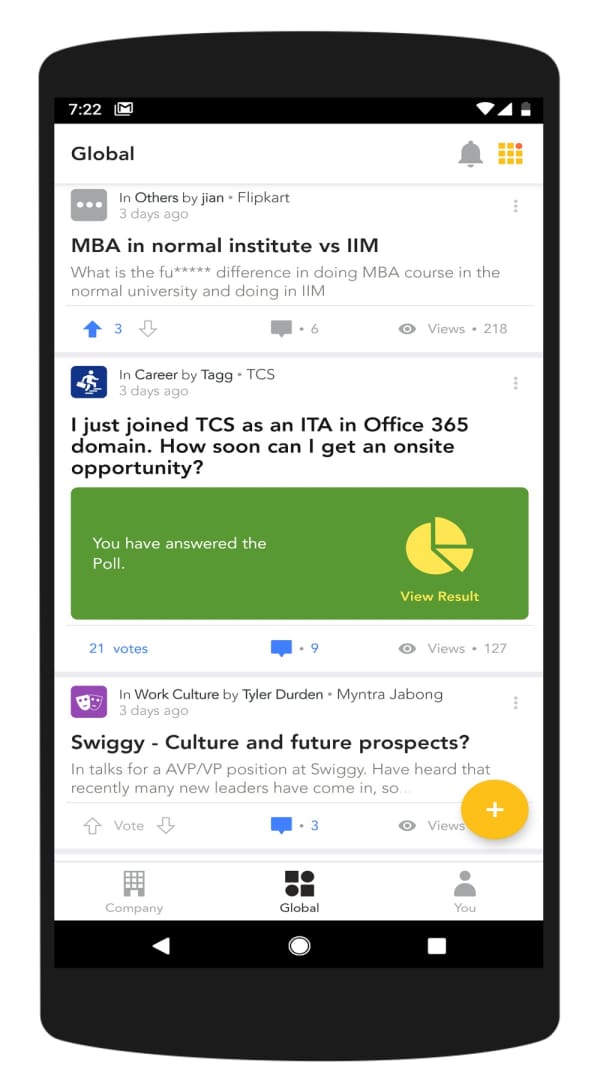Why Hush wants employees to voice their true opinions yet stay anonymous

The workplace discussion app co-founded by Ashutosh Dabral and Umesh Joshi Chandra is cheekily called Hush. But what it wants to on the contrary is to help employees shout out loud their true opinions and feelings without any fear.
Founded in September 2017, the real trigger to launch the app stemmed from the founders’ beliefs that there was no real way for employees to voice their true opinions in their companies.
“Both me and my co-founder Umesh have 16-17 years of experience in different companies, and while every company claims that they want to foster an open culture, but from an employee perspective, it is very difficult for them to say the truth of what they really feel. There is no tool or mechanism which supports that,” opines Ashutosh.
Even if there are tools, employees prefer to give out their opinions in a controlled way for fear of repercussions. Also when it comes to giving out opinions, an employee’s opinion is never taken in isolation. In a typical work setting, there are a lot of things that come into play- your level within the organization, sometimes even your gender, your educational background. Normally the voice of a senior person is given a lot more importance in any setting.
This is what the app wants to democratize-by building an app which allowed employees to voice their opinions anonymously, thus enabling them to talk more freely and give real opinions. The anonymity factor makes sure that neither Hush nor an employer can know anything about the employee except that he is an employee of your company.

Ashutosh explains why this is important.
“When we started looking at that area, we realized that the traditional approach pretty much every company follows is something like an employee survey. This more often than not, either happens once a quarter or once in six months. The current scenario is a lot trickier than what it was 10-15 years ago. If you look at the workforce a decade ago, companies were not very open, there was always a big hierarchy in every company, people knew what was ok what was not. Now you have really young people in the workforce who look for openness. So while the companies have started saying that they are open, their mindset is still the old mindset. This becomes a very confusing scenario for many people and that’s where we fit in- with our new approach of helping employees find a voice and help employers better engage with their workforce.”
How does Hush work
On the app, there are two communities for every user who comes in. The first community is the private community only for the employees and their co-workers. The app sends the employee a one-time code on their official email id. This is done to authenticate that this person is an employee of company A. But in the true sense of anonymity, the app does not store any of that information neither any personal details.
“All we do is verify that you are an employee of the company A but we don’t store your email id or any personal details. So in any scenario, we also don’t know who you are. This was done by design because we realized that if at any point, employees feel that at a future date, employers will figure out who has written this, they would never really open up,” explains Ashutosh.
The second community that people can access is what we call the global community, which is the community of all the app users across different companies. So if you have a career related query or you want to find out something from peers across your industry, or you are appearing for an interview and want to know how is the culture in that company, so you raise that question, and multiple people can respond while remaining anonymous. The only thing revealed is which company the person answering your question is from. This makes sure the person asking the question gets an authentic picture.
At the employer level, they can also sign up for the app and go ahead and see what employees are talking about. But given the volume of discussions happening, in order to make it easier for the employer to make sense of it all, Hush is launching an analytics cum employee engagement portal for the employers, where they can receive a lot of analytics based on this data.

As per Ashutosh, the app’s advantage is that every employee survey in the world uses the same 20-30 questions-so no real information is being unveiled through that survey. On Hush instead, it’s the employees who are raising the questions or initiating polls. Unlike a clichéd survey, on the app the frequency of people raising different questions is manifold. Also, what the app does is give them a safe space to vent out their real opinions, making them feel lighter, and more engaged with the whole community.
This he feels is important as engagement is not only between the employer and the employee but also between employee and coworkers and teams. As the startup looks at building the analytics platform, it is also looking at importing the company data, tying it with their own, and giving employers a holistic view of what the employees have to say.
300+ companies, over 20,000 users
Currently, the startup claims to have a little over 20,000 employees on its platform, from across 300+ companies. Almost 30-35 are such where a big chunk of employees is using it.
Hush does not have paid clients as of now, and neither does it intend to ask the employer to ask their employees to use it.
“The idea is employees will be drawn to the app as a safe space, and once we have enough employees from the company, we can always approach a company to pay for the analytics to get more insights,” explains Ashutosh.
The app, however, will remain free and employee-centric or consumer focused, he insists. In May this year, validation in terms of the idea came in the form of seed funding from led by early-stage venture capital firm Accel and saw participation from Sanjay Nadkarni, country manager at Houzz India and a bevy of angel investors.
Hush and the crowding employee engagement market
As per Deloitte Consulting LLP, the HR technology marketplace is a $400 billion market globally. It is estimated that Indian firms can save at least $600 million annually with HR tech.
No wonder there is increasing demand for tech products in all facets of the HR function and employee engagement is no exception. For instance, inFeedo with its product Amber, is one such HR Tech startup leveraging the power of AI to improve employee experience/engagement. Similarly, there is nFactorial which addresses the engagement challenge with a continuous employee feedback platform product like n!Gage.
However, Ashutosh feels the biggest differentiating factor for Hush is that it has been solely for the employees. “While employers will also benefit from it, every decision we take is around what is good, what is healthy for the employees. So the employer is more of a secondary user for us- that’s why we will keep on differentiating from other players as most of the other players are building it for the employers.”
In the next 3-4 months, it is looking at an expansion in Europe and also the US market (already has a tentative client). The startup has also launched a website towards empowering employees and those looking to enter the workforce. So while it is becoming a voice for employees, what it is also looking at is helping them in ways to uplift their career, move up to the next level.
“Getting or taking feedback is never easy. But as an employer, would you want to know what are the things your employees don’t like about you than not know them?” questions Ashutosh.
Given that a majority of most of the employers would answer in the affirmative, it’s safe to say, clear Hush has a loud future ahead.











